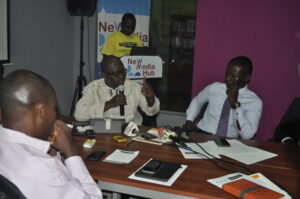Major (rtd) Ablorh-Quarcoo told the GRAPHIC BUSINESS that although the Petroleum Revenue Management Act(PRMA ) (Act) 815 stipulates that oil revenues are to be spent on four priority areas, the current trend is to spread thinly over so many areas, creating room for mismanagement.
“At the end of the day, we are looking at the revenue and how it has been utilised. What our government has been doing over the years, is to go out and spend on things that are not really priorities of the citizens,” he said.
He added, “at least I expect political parties which are competing for the mandate of the citizens to come clean on the petroleum revenue spending. The PRMA mandates governments to select four prior areas and not all 12 areas.”
Major (rtd) Ablorh-Quarcoo explained, “what we have seen in the past is this, for example, there is an area called capacity building, but it incorporates everything. It is just an omnibus for mismanagement.”
Four prior areas were selected to benefit from oil revenues namely, capacity building, agriculture modernisation, amortisation of loans and roads and other infrastructure. Over the years, however, the revenues have been spread thinly over several projects making it difficult for people to ascertain the true impact of oil revenues.
Investing in railway
He said, through the various engagements by PIAC, it was clear that citizens were looking for a clear plan on how to use oil revenues to leave a lasting legacy.
One of such legacies, he mentioned, was the development of a railway system from down South to the North to transport goods and passengers.
He said the need for a railway system ran through suggestions at almost all the public engagements organised by PIAC and it was therefore important for the various political parties to consider it.
Develop vision for oil sector
The Africa Regional Representative of the Natural Resource Governance Institute (NRGI), Mr Samuel Bekoe said it was important to develop a vision for the extractive sector in Ghana as part of the long term development plan and make it politically binding.
“We don’t have a vision for the extractive sector, you ask any politician that where do you want to see oil and gas in the next 10 years; there is no answer for you,” he said.
He added “we need to draft a vision, make it politically binding, or depoliticise it so that any government that comes will continue with that vision. We need a consensus of the current political parties to build that vision.”
The forum
Organised by Penplusbytes, the forum brought together representatives of some political parties, Civil Society Organisations (CSOs) and the media to deliberate on the relevance of oil and gas issues in the upcoming elections.
It also sought to set an issue-based agenda for the various political parties to promote an oil and gas campaign agenda and also to promote an informed citizens’ engagement on oil and gas issues.
A Resource Person at Penplusbyte, Mr Fred Avornyo said the essence of the forum was to make the 2016 elections an issue based one, driving the oil and gas agenda.
He said on the whole, elections in Ghana had not been issue-based and discussions had almost always been based on the personalities involved in the elections.
This, he said, was largely due to the fact that the electorates did not have full or even partial information on the oil and gas sector to guide their decision making at the polls.
It has been identified that citizens are unable to question and hold politicians accountable during elections on oil and gas issues due to a number of reasons, including the lack of advocacy and media push to promote oil and gas issues in the electoral discourse.
There is also the lack of amplification of political parties policy position on the management of the oil and gas sector and low citizens input to inform electoral decisions across the country.
Source:http://www.graphic.com.gh/business/business-news/political-parties-must-be-clear-on-oil-spending-priorities-former-piac-chair.html

 A former Chairman of the Public Interest and Accountability Committee (PIAC), Major (rtd) Daniel Ablorh-Quarcoo has said political parties contesting elections must present a clear outline of the areas they intend to invest oil revenues.
A former Chairman of the Public Interest and Accountability Committee (PIAC), Major (rtd) Daniel Ablorh-Quarcoo has said political parties contesting elections must present a clear outline of the areas they intend to invest oil revenues.

